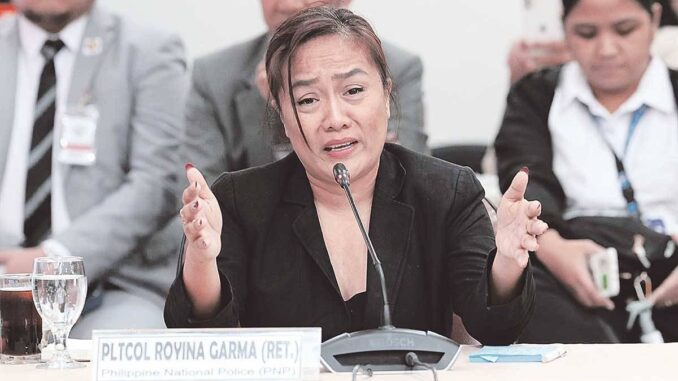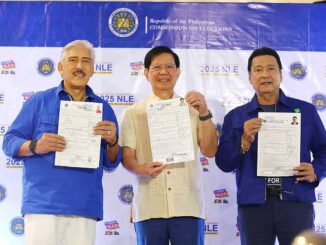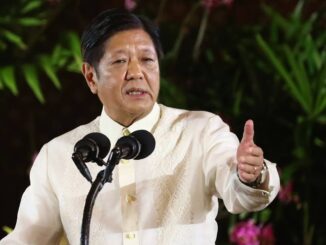
RETIRED police colonel Royina Garma told lawmakers Friday night that former president Rodrigo Duterte had ordered her to find a police official to lead a national anti-drug task force that would replicate the so-called Davao model, which gave law enforcers P20,000 for each street-level drug suspect killed.
Testifying before the House Quad Committee hearing on Friday, Garma — who at times broke down in tears — said Duterte instructed her in May 2016 to find a Philippine National Police (PNP) officer who was a member of the Iglesia Ni Cristo to lead the task force.
“The Davao Model involves three levels of payments or rewards. First is the reward if the suspect is killed. Second is the funding of planned operations. Third is the refund of operational expenses,” Garma said.
MELTDOWN Former Philippine Charity Sweepstakes Office general manager Royina Garma breaks down as she testifies before the House of Representatives how ex-president Rodrigo Duterte orchestrated a nationwide campaign against illegal drugs that resulted in extrajudicial killings (EJKs). Garma, a former police lieutenant colonel who helped Duterte carry out his war on drugs, testified anew before the quad committee investigating the EJKs on Oct. 11, 2024. PHOTO COURTESY OF THE HOUSE OF REPRESENTATIVES
Garma said she recommended her upperclassman at the PNP Academy, then police colonel Edilberto Leonardo, who was tasked to form the police force after meeting with Duterte.
Leonardo’s role was expanded, and a formal proposal for the task force’s operations was submitted to Duterte through Bong Go, then the special assistant to the President.
“Leonardo subsequently informed me that he had prepared a proposal, routed through Bong Go, outlining the task force’s operations, which would encompass Luzon, Visayas and Mindanao,” Garma said.
Garma said the task force had a reward system in place where killings would earn payments and that Leonardo would report all fatalities of police operations directly to Go for inclusion in his weekly reports, ensuring expenses were refunded.
Go, a reelectionist senator, denied Garma’s testimony.
Garma said that once police operations were successful and cases were filed in court, policemen would file a report to City Hall, including the list of cases filed and the details of the case.
“Now, in case that there was an operation and there were deaths on the part of the suspects during a legitimate operation, there was a corresponding amount that was given,” Garma said.
Garma confirmed that the amounts given to policemen for those who led the successful operation were around P20,000 for street-level drug traders to around P1 million for big-time drug operators.
Speaking to quad committee co-chairman, Laguna Rep. Danilo Fernandez, Garma said she decided to submit her affidavit because of a “deep commitment to truth and a desire to help reform the PNP.”
“I realize the truth will always set us free, Mr. Chair, and at least I will be able to contribute if we really want to make this country a better place to live … for our children,” Garma told Fernandez.

Former Philippine Charity Sweepstakes Office general manager Royina Garma breaks down as she narrates how ex-president Rodrigo Duterte orchestrated a nationwide campaign against illegal drugs that led to extrajudicial killings in the country during the House of Representatives hearing on Oct. 11, 2024. PHOTOS FROM THE HOUSE OF REPRESENTATIVES

Former Philippine Charity Sweepstakes Office general manager Royina Garma breaks down as she narrates how ex-president Rodrigo Duterte orchestrated a nationwide campaign against illegal drugs that led to extrajudicial killings in the country during the House of Representatives hearing on Oct. 11, 2024. PHOTOS FROM THE HOUSE OF REPRESENTATIVES

Former Philippine Charity Sweepstakes Office general manager Royina Garma breaks down as she narrates how ex-president Rodrigo Duterte orchestrated a nationwide campaign against illegal drugs that led to extrajudicial killings in the country during the House of Representatives hearing on Oct. 11, 2024. PHOTOS FROM THE HOUSE OF REPRESENTATIVES

Former Philippine Charity Sweepstakes Office general manager Royina Garma breaks down as she narrates how ex-president Rodrigo Duterte orchestrated a nationwide campaign against illegal drugs that led to extrajudicial killings in the country during the House of Representatives hearing on Oct. 11, 2024. PHOTOS FROM THE HOUSE OF REPRESENTATIVES

Former Philippine Charity Sweepstakes Office general manager Royina Garma breaks down as she narrates how ex-president Rodrigo Duterte orchestrated a nationwide campaign against illegal drugs that led to extrajudicial killings in the country during the House of Representatives hearing on Oct. 11, 2024. PHOTOS FROM THE HOUSE OF REPRESENTATIVES

Former Philippine Charity Sweepstakes Office general manager Royina Garma breaks down as she narrates how ex-president Rodrigo Duterte orchestrated a nationwide campaign against illegal drugs that led to extrajudicial killings in the country during the House of Representatives hearing on Oct. 11, 2024. PHOTOS FROM THE HOUSE OF REPRESENTATIVES

Former Philippine Charity Sweepstakes Office general manager Royina Garma breaks down as she narrates how ex-president Rodrigo Duterte orchestrated a nationwide campaign against illegal drugs that led to extrajudicial killings in the country during the House of Representatives hearing on Oct. 11, 2024. PHOTOS FROM THE HOUSE OF REPRESENTATIVES

Former Philippine Charity Sweepstakes Office general manager Royina Garma breaks down as she narrates how ex-president Rodrigo Duterte orchestrated a nationwide campaign against illegal drugs that led to extrajudicial killings in the country during the House of Representatives hearing on Oct. 11, 2024. PHOTOS FROM THE HOUSE OF REPRESENTATIVES

Former Philippine Charity Sweepstakes Office general manager Royina Garma breaks down as she narrates how ex-president Rodrigo Duterte orchestrated a nationwide campaign against illegal drugs that led to extrajudicial killings in the country during the House of Representatives hearing on Oct. 11, 2024. PHOTOS FROM THE HOUSE OF REPRESENTATIVES
Garma also said that no one forced her to reveal everything in her affidavit, as she said it took her a week to make some “reflections.”
Meanwhile, former Bayan Muna representative Neri Colmenares, who sat on the panel as a resource person, said they are hoping to get justice for the victims of Duterte’s drug war from the International Criminal Court.
Gabriela Rep. Arlene Brosas, on the other hand, urged the Marcos government to cooperate with the ICC in its investigation of extrajudicial killings, despite its insistence not to cooperate with the court as it “infringes on the sovereignty of the Philippine justice system.”
Aside from Garma, the committee heard from relatives of those who were killed in the drug war in Davao and Cebu cities, where Garma, as a police colonel, was once assigned.
Go vehemently denied the allegation that there was a reward system in the drug war.
“I would like to clarify that no reward system was implemented in exchange for anyone’s life. Unfortunately, the times are reversed now. Politics interferes with the investigations, and the efforts of the previous administration to clean the country against criminality and drugs are being ignored for the future of the people and our children,” Go said in Filipino.
Go also denied the allegation that the supposed reward was coursed through him.
“As a Special Assistant of the President at that time, I did not have any participation, directly or indirectly, in the operational requirements of the war on drugs,” he said.
“As outlined in the executive order that established my role, my responsibilities were strictly limited to scheduling, appointments, and presidential engagements. I was not involved in any police operations,” GO said.
“So, I don’t interfere with that. Let me be clear. My office has nothing to do with the operation and organization of the police. I also did not personally handle the money of the President’s office because that was not part of my duties then,” he added.
Go said Garma’s testimony was made to muddle the real issue — her participation in an alleged murder plot.
He said malicious and unsubstantiated statements should not be in any credible investigation.
“I would strongly encourage the Senate to conduct an impartial investigation on these allegations,” Go added.
On Saturday, former senator Leila de Lima said she hoped that more revelations would surface about Duterte’s war on drugs.
On social media, de Lima said Garma, who she brands as Duterte’s “favorite policewoman,” was the first to “stab her commander in chief in the back.”
JAVIER JOE ISMAEL, ARIC JOHN SY CUA





Be the first to comment